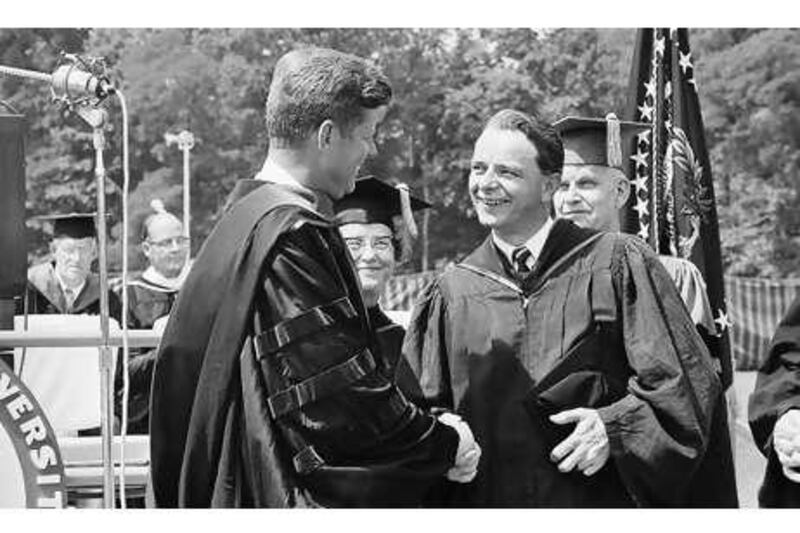Robert Byrd was not only the longest-serving senator in the history of the United States, he was also the longest-serving congressional member having been elected to Congress in 1952, until he joined the Senate in 1959. He was still a senator at his death. Asked once by another senator how many presidents he had served under, Byrd replied: "None. I have served with presidents, not under them." Born Cornelius Calvin Sale Jnr, in the Appalachian mountains of North Carolina, he was adopted by an aunt and uncle, Vlurma and Titus Byrd, after his mother died in the 1918 flu pandemic when he was a year old. He lived with them in the coal-mining area of southern West Virginia and took the name Robert Carlyle Byrd.
Unable to afford college, he became a petrol pump attendant, butcher and grocery salesman, before training as a welder in shipyards in Florida and Baltimore during the war, before returning to West Virginia. He joined the Ku Klux Klan in 1942, at the age of 24. He later said he thought the Klan could provide an outlet for his talents and ambitions but would long live to regret it. "I have apologised a thousand times," he said, "and I don't mind apologising over and over again. I can't erase what happened."
He left the Klan in 1943, and in 1946 entered the West Virginia House of Delegates. In 1950, he was elected to the state Senate of West Virginia. In 1952, he was elected and re-elected twice to the House of Representatives before becoming the Democratic senator for West Virginia, defeating the Republican incumbent who supported civil rights. Byrd opposed the Civil Rights Act of 1964. He made a speech of more than 15 hours to defeat it. He also opposed the nomination of a black justice, Thurgood Marshall, to the US Supreme Court. He studied law, graduating after he had joined the Senate. While his racist past filled him with shame, he claimed his proudest moment was his vote opposing authorisation of the Iraq war in October 2002.
He supported Barack Obama in the primaries, describing the young senator as "a noble-hearted patriot and humble Christian", and on Christmas Eve last year, he voted for healthcare reform with the words: "This is for my friend Ted Kennedy. Aye." He played the fiddle and became a master of the filibuster - his knowledge of Senate procedures was unrivalled. He had a penchant for classical allusions (as one obituarist, Rupert Cornwell, said: "You might have imagined he was an eye witness to the murder of Julius Caesar.")
In 2005, his memoirs, Robert C Byrd: Child of the Appalachian Coalfields, were published. He also wrote a four-volume history of the Senate. But the state that returned him to the Senate a record eight times remained paramount. For two decades he was a member of the powerful Appropriations Committee and it was estimated that he was instrumental in about US$41 billion (Dh150bn) being appropriated for his beloved mountain state. More than 40 buildings and other constructions in West Virginia bear his name.
In June 2006, Byrd became the longest-serving senator in US history, surpassing Strom Thurmond's record. In November last year, he became the longest-serving member of Congress. At his death, he was third in line to the presidency after the vice president and speaker of the House. Counting his time in state houses, he had been an elected representative for 64 years. Born on November 20, 1917, he married his childhood sweetheart, Erma, in 1937. She died in 2006. He is survived by their two daughters. He died on June 28, aged 92.
* The National






